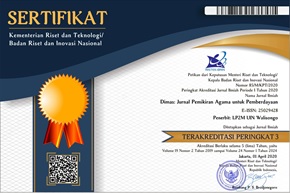collections_bookmark Focus and Scope
FOCUS
This journal focuses on research results based on community services, increasing the capacity of society and community empowerment, and innovations of community empowerment worldwide.
SCOPE
This journal covers studies on developing and implementing religion, science, and technology through community service and empowerment.
create_new_folder Section Policies
Articles
device_hub Peer Review Process
Dimas: Jurnal Pemikiran Agama untuk Pemberdayaan follows a double-blind peer review process. Submitted manuscripts will be selected through an initial review by the editors to assess their conformity with Journal Focus, Scope, and author guidelines. Subsequently, manuscripts will be sent to the peer reviewers, and the next selection will be through blind review. Afterward, manuscripts will be returned to the authors for revision. These processes take thereabouts a month. If the revised manuscripts have been amended to incorporate the reviewers’ suggestions, it is accepted for publication (copyediting, layout, and proofreading).
event_note Publication Frequency
This Journal published twice in a year, on April and October.
copyright Open Access Policy
This journal provides an immediate open access to its content. This is based on the principle that research should be freely available to the public and support the global exchange of knowledge.
unarchive Archiving
This journal utilizes the LOCKSS system to create a distributed archiving system among participating libraries and permits those libraries to create permanent archives of the journal for purposes of preservation and restoration. More...
bookmark_border About Journal
Dimas: Jurnal Pemikiran Agama untuk Pemberdayaan ISSN: 1411-9188 (p); 2502-9428 (e); is a research and community service journal published by Institute for Research and Community Services (LP2M), State Islamic University (UIN) Walisongo Semarang. It specializes in Indonesian Islamic studies in particular, and Southeast Asian Islamic studies in general, and is intended to communicate original researches about devotion and current issues on the subject. The subject covers studies on developing and implementing religion, science, and technology through community service and empowerment.
bookmark_border Publication Ethic and Malpractice Statement
Dimas: Jurnal Pemikiran Agama untuk Pemberdayaan, is a peer-reviewed journal. It is available online as open access sources as well as in print. This statement clarifies ethical behaviour of all parties involved in the act of publishing an article in this journal, including the author, the editor-in-chief, the Editorial Board, the reviewer, and the publisher.
The article submitted has not yet been published elsewhere, original, research-based, unpublished and not under review for possible publication in other journals.
Ethical Guideline for Journal Publication
The publication of an article in Dimas: Jurnal Pemikiran Agama untuk Pemberdayaan is an essential building block in the development of a coherent and respected network of knowledge. It is a direct reflection of the quality of the work of the authors and the institutions that support them. Peer-reviewed articles support and embody the scientific methods. It is therefore important to agree upon standards of expected ethical behavior for all parties involved in the act of publishing: the author, the editor, the reviewer, the publisher, and the society. As the publisher of Dimas: Jurnal Pemikiran Agama untuk Pemberdayaan, Publisher takes its duties of guardianship over all stages of publishing seriously and it recognizes its ethical and other responsibilities. Publisher committed to ensuring that advertising, reprint or other commercial revenue has no impact or influence on editorial decisions.
Publication Decisions
The editor of the Dimas: Jurnal Pemikiran Agama untuk Pemberdayaan is responsible for deciding which of the articles submitted to the journal should be published. The validation of the work in question and its importance to researchers and readers must always drive such decisions. The editors may be guided by the policies of the journal's editorial board and constrained by such legal requirements as shall then be in force regarding libel, copyright infringement and plagiarism.
Fair Play
An editor at any time evaluate manuscripts for their intellectual content without regard to race, gender, sexual orientation, religious belief, ethnic origin, citizenship, or political philosophy of the authors.
Confidentiality
The editor and any editorial staff must not disclose any information about a submitted manuscript to anyone other than the corresponding author, reviewers, potential reviewers, other editorial advisers, and the publisher, as appropriate.
Disclosure and Conflicts of Interest
Unpublished materials disclosed in a submitted manuscript must not be used in an editor's own research without the express written consent of the author.
Duties of Reviewers
Contribution to Editorial Decisions
Peer review assists the editor in making editorial decisions and through the editorial communications with the author may also assist the author in improving the paper.
Promptness
Any selected referee who feels unqualified to review the research reported in a manuscript or knows that its prompt review will be impossible should notify the editor and excuse himself from the review process.
Confidentiality
Any manuscripts received for review must be treated as confidential documents. They must not be shown to or discussed with others except as authorized by the editor.
Standards of Objectivity
Reviews should be conducted objectively. Personal criticism of the author is inappropriate. Referees should express their views clearly with supporting arguments.
Acknowledgement of Sources
Reviewers should identify relevant published work that has not been cited by the authors. Any statement that an observation, derivation, or argument had been previously reported should be accompanied by the relevant citation. A reviewer should also call to the editor's attention any substantial similarity or overlap between the manuscript under consideration and any other published paper of which they have personal knowledge.
Disclosure and Conflict of Interest
Privileged information or ideas obtained through peer review must be kept confidential and not used for personal advantage. Reviewers should not consider manuscripts in which they have conflicts of interest resulting from competitive, collaborative, or other relationships or connections with any of the authors, companies, or institutions connected to the papers.
Duties of Authors
Reporting standards
Authors of reports of original research should present an accurate account of the work performed as well as an objective discussion of its significance. Underlying data should be represented accurately in the paper. A paper should contain sufficient detail and references to permit others to replicate the work. Fraudulent or knowingly inaccurate statements constitute unethical behaviour and are unacceptable.
Originality and Plagiarism
The authors should ensure that they have written entirely original works, and if the authors have used the work and/or words of others that this has been appropriately cited or quoted.
Multiple, Redundant or Concurrent Publication
An author should not in general publish manuscripts describing essentially the same research in more than one journal or primary publication. Submitting the same manuscript to more than one journal concurrently constitutes unethical publishing behaviour and is unacceptable.
Acknowledgement of Sources
Proper acknowledgment of the work of others must always be given. Authors should cite publications that have been influential in determining the nature of the reported work.
Authorship of the Paper
Authorship should be limited to those who have made a significant contribution to the conception, design, execution, or interpretation of the reported study. All those who have made significant contributions should be listed as co-authors. Where there are others who have participated in certain substantive aspects of the research project, they should be acknowledged or listed as contributors. The corresponding author should ensure that all appropriate co-authors and no inappropriate co-authors are included on the paper, and that all co-authors have seen and approved the final version of the paper and have agreed to its submission for publication.
Disclosure and Conflicts of Interest
All authors should disclose in their manuscript any financial or other substantive conflicts of interest that might be construed to influence the results or interpretation of their manuscript. All sources of financial support for the project should be disclosed.
Fundamental errors in published works
When an author discovers a significant error or inaccuracy in his/her own published work, it is the author’s obligation to promptly notify the journal editor or publisher and cooperate with the editor to retract or correct the paper.
bookmark_border Screening for Plagiarism
Articles submitted to Dimas: Jurnal Pemikiran Agama untuk Pemberdayaan will be filtered using Turnitin software, with a maximum of 20% similarities permitted.
Plagiarism includes:
- Word-for-word plagiarism – borrowing another author’s language word-for-word but not putting it in quotation marks or citing it correctly.
- Source plagiarism – using the ideas of others without giving recognition or citing the source explicitly.
- Plagiarism of authorship – presenting another author's work as one’s own.
- Self-plagiarism - authors publishing an article in more than one journal by recycling papers. The important issue related to self-plagiarism is that when citing one's own work, significant changes must have been made to the new article. The previous article should only contain a small percentage of any new article produced. So readers will receive new information, which tmay inspired by but different from the previous articles.
bookmark_border Allegation of Research Misconducts
Research misconduct means fabrication, falsification, citation manipulation, or plagiarism in producing, performing, or reviewing research and writing an article or reporting research results. When authors are found to have been involved with research misconduct or other serious irregularities pertaining to articles that have been published in other scientific journals, the editors have a responsibility to ensure the accuracy and integrity of the scientific record.
In cases of suspected misconduct, the editors and editorial board will use the best practices of COPE to resolve the complaint and address the misconduct fairly. This will include an investigation of the allegation by the editors. A submitted manuscript that is found to be the product of such misconduct will be rejected. In cases where a published paper is found to contain such misconduct, a retraction will be published and linked to the original article.
Step 1:
The first step of this process involves determining the validity of the allegation. An assessment is made whether the allegation is consistent with the definition of research misconduct. This initial step also involves determining whether the alleged individuals have relevant conflicts of interest.
Step 2:
If scientific misconduct or the presence of other substantial research irregularities is a possibility, the allegations are shared with the corresponding author, who is requested to provide a detailed response on behalf of the co-authors.
Step 3:
After the author’s response is received and evaluated, an additional review is done, possibly with the involvement of experts (such as statistical reviewers).
Step 4:
In cases where it is unlikely that misconduct has occurred, clarifications and/or additional analyses are published as letters to the editor. However, a correction notice may suffice.
Institutions are expected to conduct an appropriate and thorough investigation of allegations of scientific misconduct. Ultimately, authors, journals, and academic institutions have the obligation to ensure the accuracy of the scientific record. By responding appropriately to concerns about scientific misconduct and taking necessary actions based on evaluation of these concerns, the journal will continue to fulfill the responsibilities of ensuring the validity and integrity of the scientific record.
Retraction
A paper published in Dimas: Jurnal Pemikiran Agama untuk Pemberdayaan will be retracted in the following conditions are fulfilled:
- There is clear evidence that the findings are unreliable, either as a result of misconduct (e.g., data fabrication) or honest error (e.g., miscalculation or experimental error)
- The study has previously been published elsewhere, without proper cross-referencing, permission, or justification (i.e., cases of redundant publication)
- It constitutes plagiarism
- It reports unethical research
The mechanism of retraction follows the Retraction Guidelines of the Committee on Publication Ethics (COPE), which can be accessed at https://publicationethics.org/files/retraction%20guidelines.pdf.
bookmark_border Revenue Sources, Advertising, and Direct Marketing Policy
Revenue Sources
The operations of Dimas: Jurnal Pemikiran Agama untuk Pemberdayaan are funded by the Ministry of Religious Affairs Republic of Indonesia, through Daftar Isian Pelaksanaan Anggaran (DIPA) of Universitas Islam Negeri Walisongo Semarang, Indonesia.
Advertising
Dimas: Jurnal Pemikiran Agama untuk Pemberdayaan does not accept advertising from any parties.
Direct Marketing
In promoting the journal and the results of publications to the public, the journal does not wish to act in ways that are detrimental to other parties (e.g., spreading spam) or share misleading information with prospective authors and publishers.








